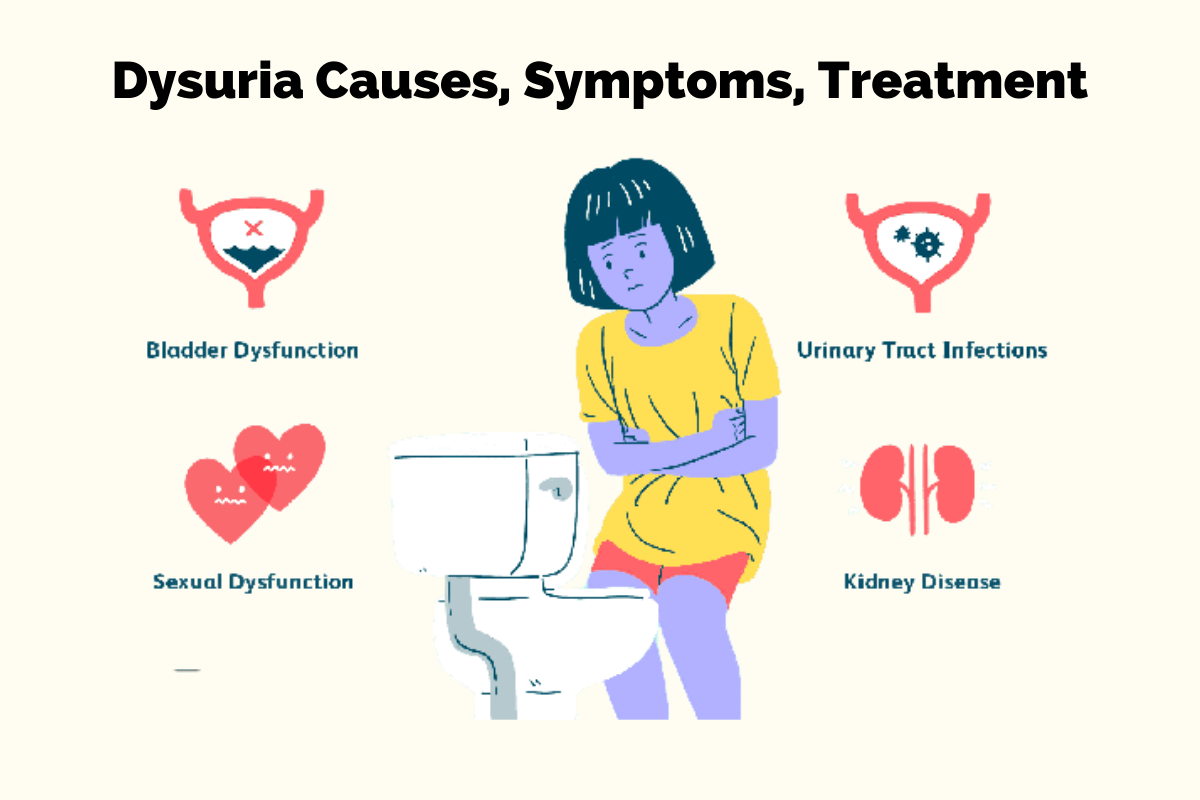Dysuria, commonly referred to as painful urination, is a condition characterized by a burning, stinging, or discomfort during or following the act of urinating. It is a prevalent issue that affects individuals of all ages, genders, and backgrounds. This comprehensive guide will explore the various causes of dysuria, its symptoms, diagnostic methods, and treatment options available to those experiencing painful urination. Understanding dysuria can help you make informed decisions about your health and seek appropriate care when needed.

1: Causes of Dysuria
1.1 Infections: One of the leading causes of dysuria is urinary tract infections (UTIs). These infections can occur in any part of the urinary system, including the kidneys, bladder, ureters, and urethra. Bacterial infections are the most common cause, with Escherichia coli (E. coli) being the primary culprit. Other common infections causing dysuria include sexually transmitted infections (STIs) such as gonorrhea and chlamydia.
1.2 Obstructions: Obstructions in the urinary tract, such as kidney stones or bladder stones, can lead to painful urination. These stones can cause inflammation, irritation, and blockage, making it difficult for urine to pass through the urinary system.
1.3 Inflammation: Inflammation of the bladder (cystitis) or urethra (urethritis) can result in dysuria. These conditions can be caused by infections, irritants, or trauma.
1.4 Prostate issues: Enlarged prostate (benign prostatic hyperplasia) or prostatitis (inflammation of the prostate) can lead to dysuria in men. An enlarged prostate can compress the urethra, making it difficult for urine to pass through, while prostatitis can cause pain and inflammation in the area.
1.5 Vaginitis: Inflammation or infection of the vagina (vaginitis) can cause painful urination in women. Common causes include bacterial vaginosis, yeast infections, and trichomoniasis.
1.6 Interstitial cystitis: Also known as painful bladder syndrome, interstitial cystitis is a chronic condition that causes bladder pain and frequent, painful urination.
1.7 Chemical irritants: Certain chemicals found in products such as soaps, bubble baths, and spermicides can irritate the urinary tract and cause painful urination.
1.8 Medications: Some medications, including certain chemotherapy drugs, diuretics, and antibiotics, can cause dysuria as a side effect.
1.9 Cancer: In rare cases, bladder or urethral cancer may cause dysuria.
2: Symptoms and Diagnosis of Dysuria
2.1 Symptoms: In addition to pain, burning, or discomfort during urination, other symptoms may accompany dysuria. These can include increased urgency and frequency of urination, cloudy or foul-smelling urine, and blood in the urine. It is essential to seek medical attention if you experience these symptoms to determine the underlying cause and receive appropriate treatment.
2.2 Diagnosis: To diagnose the cause of dysuria, healthcare providers will typically take a medical history, perform a physical examination, and conduct various laboratory tests. These tests may include a urinalysis, urine culture, and STI screening. In some cases, imaging studies like ultrasound or cystoscopy may be required to visualize the urinary tract and identify obstructions or other abnormalities.
3: Treatment Options for Dysuria
3.1 Antibiotics: For bacterial infections, such as UTIs or STIs, antibiotics are the primary treatment. The type and duration of antibiotics will depend on the specific infection and its severity.
3.2 Pain relievers: Over-the-counter pain relievers, such as ibuprofen or acetaminophen, can help alleviate the pain and discomfort associated with dysuria. However, these medications should be used cautiously and according to the manufacturer’s guidelines.
3.3 Alpha-blockers: In cases of dysuria caused by an enlarged prostate, alpha-blockers may be prescribed to relax the muscles around the prostate and urethra, making it easier to urinate.
3.4 Antifungal medications: For yeast infections causing vaginitis and painful urination, antifungal medications are available in various forms, such as creams, suppositories, or oral medications.
3.5 Antispasmodics: In cases of interstitial cystitis, antispasmodic medications can help relax the bladder muscles and reduce the frequency and intensity of painful urination.
3.6 Lifestyle changes: In some instances, simple lifestyle modifications can help manage dysuria. These may include drinking plenty of water, avoiding caffeine and alcohol, wearing loose-fitting clothing, and using unscented hygiene products.
3.7 Surgical interventions: In rare cases, surgical intervention may be required to treat the underlying cause of dysuria. This can include the removal of kidney or bladder stones, treatment of urethral strictures, or addressing bladder or urethral cancer.
4: Prevention and Home Remedies
4.1 Prevention: While not all cases of dysuria can be prevented, certain measures can be taken to reduce the risk of developing painful urination. These include practicing good hygiene, urinating before and after sexual activity, staying well-hydrated, and wearing cotton underwear. Additionally, promptly addressing any infections, such as UTIs or STIs, can help prevent dysuria from developing or worsening.
4.2 Home remedies: Some home remedies can help alleviate the symptoms of dysuria. These include drinking plenty of water to help flush out the urinary system, using a heating pad on the lower abdomen to ease discomfort, and taking over-the-counter pain relievers as directed.
Dysuria, or painful urination, is a common condition that can significantly impact an individual’s quality of life. By understanding the various causes of dysuria, recognizing its symptoms, and seeking prompt medical attention, you can ensure proper diagnosis and treatment. With a range of treatment options available, including medications, lifestyle changes, and surgical interventions, most cases of dysuria can be effectively managed. Furthermore, by implementing preventive measures and utilizing home remedies, you can take an active role in maintaining your urinary health and reducing the risk of developing dysuria.
